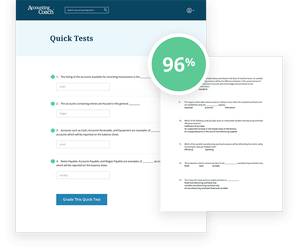For multiple-choice and true/false questions, simply press or click on what you think is the correct answer. For fill-in-the-blank questions, press or click on the blank space provided.
If you have difficulty answering the following questions, read our In-Depth Explanation for this topic.
In Total Even When Volume Triples
In Total Within A Reasonable Change In Volume
On A Per Unit Basis As Volume Changes
In Total As Volume Changes
On A Per Unit Basis As Volume Changes
True
False
True
False
True
False
True
False
True
False
True
False
True
False
True
False
Future Costs That Differ
Future Costs That Do Not Differ
Historical Costs
Fixed
Variable
Mixed
Fixed
Variable
Mixed
Fixed
Variable
Mixed
Fixed
Variable
Mixed
Fixed
Variable
Mixed
Fixed
Variable
Mixed

Access 1,800+ Premium Test Questions
Receive instant access to our entire collection of premium materials, including our 1,800+ test questions.
View All PRO FeaturesFeatures
Free
PRO
Read 3,034 Testimonials